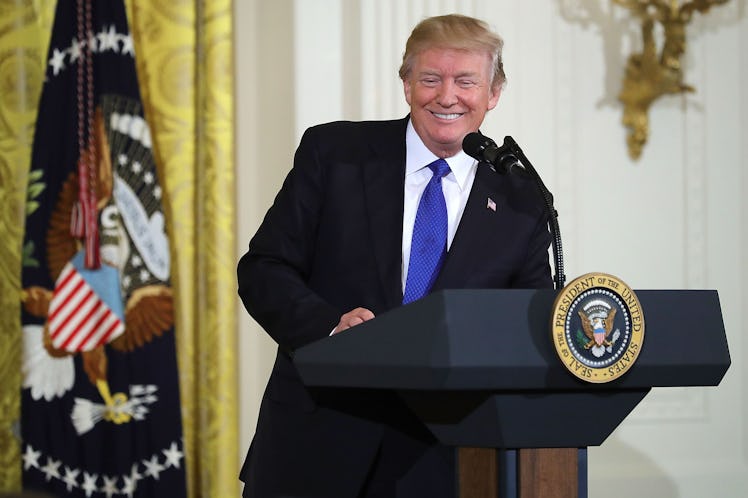
Trump's Says He's Open To Dreamers Becoming Citizens, But Does It Mean Anything?
Before President Donald Trump jetted off for his latest international trip, he left reporters with an eye-opening quote about the status of "Dreamers," the undocumented young immigrants protected from deportation by the expiring Deferred Actions for Childhood Arrivals (DACA) program which was at the center of the recent government shutdown. The president said at the White House on Wednesday, Jan. 24, that he was open to providing a pathway to citizenship for Dreamers, adding that "It's going to happen at some point in the future." Despite the president's words indicating a will to grant permanent legal status, and beyond, to DACA recipients, there's still reason to question what Trump's quote about Dreamers actually means for the current immigration debate.
First, it's important to consider more of what Trump said on Wednesday.
When asked to clarify his position on a potential pathway to citizenship, Trump said "Over a period of 10 to 12 years, somebody does a great job, they work hard — that gives incentive to do a great job. Whatever they’re doing, if they do a great job, I think it’s a nice thing to have the incentive of, after a period of years, being able to become a citizen."
When asked whether Dreamers should worry about whether they'd be deported after the March 5 deadline for DACA to end, Trump said, "Tell them not to worry about it. We're gonna solve the problem. Now, it's up to the Democrats, but they [Dreamers] should not be concerned."
Put all the quotes together, and it's clear why Trump's latest public comments on immigration are so important. The president said he was certain that Dreamers would be given a pathway to citizenship — not just an extension of the legal status DACA provides them.
As things currently stand, DACA protects nearly 800,000 undocumented immigrants who arrived to the United States as children. Last September, Trump called for an end to the program with a six-month delay, which he said was for Congress to have time to come up with a bill that would permanently address DACA recipients' status.
But Trump also implied on Wednesday that even if the March deadline for DACA's end comes without Congress having passed a permanent fix, Dreamers would not be deported, which is a sentiment the president expressed in the past.
Those statements are big deals, especially considering how the government shutdown ended. When 33 Democrats decided on Monday, Jan. 22, to vote for a funding bill that would re-open the government, they did so with a verbal commitment from Senate Majority Leader Mitch McConnell (R-KY) to allow a vote on a bipartisan immigration reform deal that would address DACA and matters related to border security before Congress passes another funding bill.
With the latest funding deal expiring on February 8, a group of Democrat and Republican senators are working together come up with an immigration bill. One of those senators is Lindsey Graham (R-SC) who called Trump's comments on Wednesday a "breakthrough."
"With this strong statement from President Trump, I have never felt better about our chances of finding a solution on immigration," Graham said in a statement. "President Obama tried and couldn't fix immigration. President Bush tried and couldn't do it. I believe President Trump can. Today's DACA recipients can be tomorrow's Trump Dreamers."
Regardless of whether Trump's words provided a boost to the senators working on an immigration deal, the real factor that will determine how much the president's quotes on DACA mean is whether or not he communicated the same sentiments to Republicans in Congress.
Majority Leader McConnell has already said once that he doesn't know where Trump stands on immigration, which affects what type of deal leading Republicans would consider.
"As soon as we figure out what he is for, then I would be convinced that we were not just spinning our wheels going to this issue on the floor, but actually dealing with a bill that has a chance to become law and therefore solve the problem," McConnell told reporters, days before the government shutdown.
Even if an immigration deal were to be agreed upon in the Senate, though, it would still have to pass through the House, where there has been little sign of a significant bipartisan effort to work on immigration.
Unless Trump actually rallies Republicans around a consistent plan, and gives them assurance that he and his White House want a pathway to citizenship, the president's words about that pathway might turn out to be meaningless.